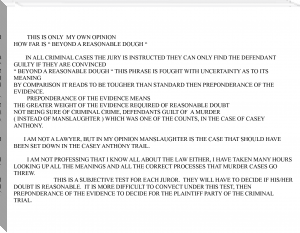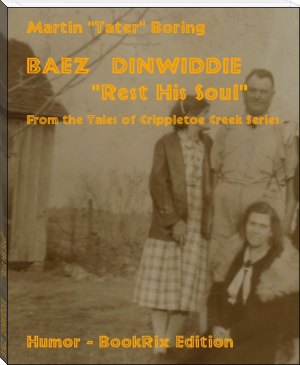All Aboard; or, Life on the Lake<br />A Sequel to "The Boat Club" by Oliver Optic (ebook reader ink .txt) 📗

- Author: Oliver Optic
Book online «All Aboard; or, Life on the Lake<br />A Sequel to "The Boat Club" by Oliver Optic (ebook reader ink .txt) 📗». Author Oliver Optic
"I don't know about that," interposed one of them. "He upset the boat on the beach."
"That was because the crew did not obey orders," replied Charles.
"He is second in command," replied Tim. "Do you agree to that?"
"Yes," answered several, who were willing to follow the lead of the chief.
"Very well; I shall command one party and Charley the other; each in his own boat and on the island. Now we will divide each party into two squads, or watches."
"What for?" asked Barney.
"To keep watch, and do any duty that may be wanted of them."
Tim had got this idea of an organization from his piratical literature. Indeed, the plan of encamping upon the island was an humble imitation of a party of buccaneers who had fortified one of the smallest of the islands in the West Indies. The whole scheme was one of the natural consequences of reading bad books, in which the most dissolute, depraved, and wicked men are made to appear as heroes, whose lives and characters are worthy of emulation.
Such books fill boys' heads with absurd, not to say wicked ideas. I have observed their influence in the course of ten years' experience with boys; and when I see one who has named his sled "Blackbeard," "Black Cruiser," "Red Rover," or any such names, I am sure he has been reading about the pirates, and has got a taste for their wild and daring exploits—for their deeds of blood and rapine. One of the truant officers of Boston, whose duty it is to hunt up runaway boys, related to me a remarkable instance of the influence of improper books. A few years ago, two truant boys were missed by their parents. They did not return to their homes at night, and it was discovered that one of them had stolen a large sum of money from his father. A careful search was instituted, and the young reprobates were traced to a town about ten miles from the city, where they were found encamped in the woods. They had purchased several pistols with their money, and confessed their intention of becoming highwaymen! It was ascertained that they had been reading the adventures of Dick Turpin, and other noted highwaymen, which had given them this singular and dangerous taste for a life in violation of the laws of God and man. My young readers will see where Tim got his ideas, and I hope they will shun books which narrate the exploits of pirates and robbers.
Two officers were chosen in each band to command the squads. Tim was shrewd enough to know that the more offices he created, the more friends he would insure—members who would stand by him in trial and difficulty. In Charles's band, one of these offices was given to the turbulent Barney; his fidelity was thus secured, and past differences reconciled.
"Now, Charley, my crew shall put up one tent, and yours the other."
"Very well," replied Charles, who derived a certain feeling of security from the organization which had just been completed, and he began to feel more at home.
The stakes were driven down, and the poles placed upon the forks; but sewing the cloth together for the covering was found to be so tedious a job that it was abandoned. The strips were drawn over the frame of the tent, and fastened by driving pins through it into the ground. Then it was found that there was only cloth enough to cover one tent. Tim's calculations had been defective.
"Here's a pretty fix," said Tim.
"I have it," replied Charles. "Come with me, Barney, and we will have the best tent of the two."
Charles led the way to the Sylph, and getting on board of her by the aid of one of the boats, they proceeded to unbend her sails.
"Bravo! Charley," said Barney. "That's a good idea; but why can't some of us sleep in this bit of a cuddy house?"
"So we can. Here is Uncle Ben's boat cloak, which will make a first-rate bed. Don't say a word about it, though, and you and I can have it all to ourselves."
The sails were carried ashore, and were ample covering for the tent. Dry leaves, which covered the ground, were then gathered up and put inside for their bed.
"Now, Tim, they are finished, and for one, I begin to feel sleepy," said
Charles.
"We can't all sleep, you know," added the prudent chief.
"Why not?"
"We must set a watch."
"I am too sleepy to watch," said Charles, with a long gape. "The clock has just struck one."
"You needn't watch, you are the second in command."
"I see," replied Charles, standing upon his dignity.
"There are four watches, and each must do duty two hours a night. Who shall keep the first watch?"
"I will," said Barney.
"Good! You must keep the fire going, and have an eye to both sides of the island."
"Ay, ay."
"And you must go down to the boats every time the clock strikes, to see if they are all right. If they should get adrift, you know, our game would be up."
"I'll see to it."
"At three o'clock, you must call the watch that is to relieve you."
"Who will that be?"
"I," volunteered the three other officers of the watches, in concert.
"Ben, you shall relieve him. If anything happens, call me."
Tim and his followers then retired to their tent, and buried themselves in the leaves. Charles ordered those of his band who were not on duty to "turn in;" saying that he wanted to warm his feet. The Rovers were so fatigued by their unusual labors that they soon fell asleep, and Charles then repaired to the little cabin of the Sylph. Arranging the cloak for his bed, he wrapped himself up in his great-coat and lay down.
Fatigued as he was, he could not go to sleep. The novelty of his situation, and the guilt, now that the excitement was over, which oppressed his conscience, banished that rest his exhausted frame required. He heard the village clock strike two and three; and then he rose, unable to endure the reproaches of his own heart.
"What a fool I am!" he exclaimed to himself; and a flood of tears came to his relief. "To desert my warm bed, my happy home, the friendship of my club, for such a set of fellows as this! O, how I wish I had not come!"
Leaving the cabin, he seated himself in the stern sheets of the boat. The bright stars had disappeared, and the sky was veiled in deep black clouds. The wind blew very fresh from the north-east, and he was certain that a severe storm was approaching. He wept bitterly when he thought of the gloomy prospect.
He had repented his folly, and would have given the world to get away from the island. Ah, a lucky thought! He could escape! The Rovers were all asleep; the fresh breeze would soon drive the Sylph to the land, and he could return home, and perhaps not be missed. It was an easy thing; and without further reflection, he unfastened the cable, and dropped it overboard.
The Sylph immediately commenced drifting away from the island. Taking the helm, he put her before the wind, and was gratified to observe that she made very good headway.
The clock struck four, and he heard the footsteps of the watch upon the shore.
"Boat adrift!" shouted Ben, who was the officer of the watch.
The words were repeated several times, and in a few moments he heard Tim's voice summoning his crew. Then the Butterfly dashed down upon him, and his hopes died within him. But he had the presence of mind to crawl back again to the cabin; and when Tim came onboard, he had the appearance of being sound asleep, so that the chief did not suspect his treachery.
CHAPTER XVII. THE ESCAPE.Monday was a cold, dreary, disagreeable day. The wind continued northeast; a fine, drizzly rain was falling, and a thick fog had settled over the lake, which effectually concealed the camp of the Rovers from the main shore.
An excursion had been planned for the day by the two boat clubs; but the weather was so unpropitious that it was abandoned. About nine o'clock, however, the members of the clubs began to assemble at their halls in search of such recreation as could be found indoors.
Frank opened the Zephyr's boat-house as usual, and great was his dismay when he discovered that the boat was not in its berth. Calling Uncle Ben from the stable, he announced to him the astounding intelligence that the Zephyr had been stolen!
"What does it mean, Uncle Ben?" he asked, in deep anxiety.
"I can't tell you, Frank; only, as you say, it has been stolen. It couldn't have broken adrift."
"Of course not; and one of the windows is open."
"That accounts for it," replied Uncle Ben, as he walked down the boat-house and looked out upon the lake. "I will take the Sylph and hunt it up."
"Let me go with you, Uncle Ben."
"My eyes! but the Sylph is gone too!" exclaimed the veteran, as he perceived the moorings afloat where she usually lay.
"Strange, isn't it?"
Uncle Ben scratched his head, and did not know what to make of it.
"Here comes Tony, running with all his might," continued Frank. "What's the matter, Tony?"
"Somebody has stolen the Butterfly!" gasped Tony, out of breath."
"And the Zephyr and the Sylph!"
Several of the members of the club now arrived, and the matter was thoroughly discussed.
"Who do you suppose stole them!" said Frank.
"Who? why, Tim Bunker of course," replied Fred.
"But he must have had some help."
"Perhaps not; he has done it to be revenged, because your father turned him out of the club."
"Very likely."
"May be he'll smash them up," suggested William Bright.
"Have you seen anything of Charles this morning?" asked Mr. Hardy, entering the boat-house at this moment.
"No, sir."
"He did not sleep at home last night."
The Zephyrs looked at each other with astonishment, and most of them, probably, connected him with the disappearance of the boats. His intimacy with Tim Bunker created a great many painful misgivings, especially when Mr. Hardy told them that his son had played truant on Saturday; and one of the boys had heard of his being seen with Tim on that day. Various other facts were elicited, which threw additional light upon the loss of the boats. Mr. Hardy was in great distress. It was clear that his son had wandered farther from the path of truth than he had ever suspected.
Frank had gone up to the house to inform his father of the loss of the boats, and Captain Sedley soon joined the party. He sympathized deeply with Mr. Hardy, and was satisfied that his son could not be far off. It was impossible to search the lake, as there were no boats for the purpose.
As nothing could be done at present on the lake, Captain Sedley ordered his horse, with the intention of driving round it in search of the fugitive and of the boats. Mr. Hardy was invited to go with him.
On their arrival at Rippleton they found that Tim Bunker was missing, as well as a great many other boys. They continued to examine the shores of the lake till they reached Joe Braman's house, on the north side.
Captain Sedley inquired for his boat; and Joe, after trying to evade the truth, confessed that he had let it to Tim for a week, but did not know where he had gone with it. They were sure then that the boys were engaged in some mad enterprise: and at about eleven o'clock the two gentlemen reached home, without having obtained any intelligence of Charles.
"Have you discovered anything, Ben?" asked Captain Sedley.
"Yes, sir; I heard voices in the direction of Center Island."
"They are there, then," replied Captain Sedley, as he repaired to the boat-house.
About one o'clock the fog lifted, and revealed to the astonished party the camp of the Rovers. A large fire burned near the two tents, around which the boys were gathered, for the weather was so inclement as to render Tim's enterprise anything but romantic.
The Sylph, the two club boats, and Joe Braman's "gondola" lay near the shore, apparently uninjured.
"This is a mad frolic," said Captain Sedley; "but we may be thankful it is no





Comments (0)